30.5K Craters of the Moon National Monument by endovereric
first prev 1 next lastDescribed as a "weird and scenic landscape", Craters of the Moon certainly lives up to its reputation. It was established in 1924 to preserve the unique volcanic features of this enormous lava field. The 750,000-acre monument contains a diverse array of volcanic features including volcanic rifts, cinder cones, spatter cones, shield volcanoes and lava tube caves. A surprising number of plants and animals have adapted to live in the harsh volcanic and high desert environment. It is an excellent site for hiking, bird watching, photography, backpacking and caving (permits required). The monument is cooperatively managed by the National Park Service and Bureau of Land Management. Summer activities include guided cave walks and evening programs at the campground. Winter activities include Winter Ecology Workshops, snowshoeing, and cross-country skiing. Park is open 24 hours/day year-round. Visitor Center: Memorial Day-Labor Day 8am-6pm, rest of the year 8am-4:30pm. Closed winter holidays.

North Crater Flow
Arco, Idaho
17.9 miles SW of Arco, Idaho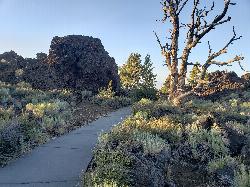
Devil's Orchard Trail
Visitors Center, Craters of the Moon National Monument
17.1 miles N of Visitors Center, Craters of the Moon National MonumentThis paved trail explores an area of cinder beds scattered with pieces of the North Crater wall. Exhibits along the trail challenge you to consider the difficulties of protecting this fragile environment. This trail is wheelchair accessible.Courtesy of nps.gov

Caves Trail
Visitors Center, Craters of the Moon National Monument
16.7 miles N of Visitors Center, Craters of the Moon National Monument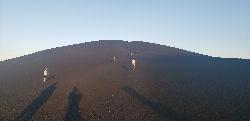
Inferno Cone
Visitors Center, Craters of the Moon National Monument
16.6 miles N of Visitors Center, Craters of the Moon National MonumentCinder cones form when gas-rich volcanic froth erupts high into the air and then piles into a mound. Climb Inferno Cone, if you wish, but don't be disappointed if you are unable to locate the source of the eruption at the top. These cinders were actually blown by the wind, and possibly squirted in this direction, from a vent far below near the Spatter Cones parking lot.
The trail to the top of Inferno Cone is steep, but rewards you with panoramic views of the Great Rift, Snake River Plain, and Pioneer Mountains. On clear days you may see the Teton Range, 100 miles to the east. Do not climb in high winds! You will be very exposed and the cinders are sometimes picked up by the wind.Courtesy of nps.gov

North Crater Trail
Visitors Center, Craters of the Moon National Monument
16.6 miles N of Visitors Center, Craters of the Moon National MonumentThis one-way trail is especially interesting for its variety. The trail traverses North Crater and drops into the crater mouth, the vent for the North Crater flow. Notice that the northwest flank of North Crater is missing. An eruption tore the wall apart, and a series of flows rafted the fragments away. The trail continues to the rim of Big Craters before descending to the Spatter Cones. No off-trail travel is permitted in the Big Craters area in order to protect fragile lava formations.Courtesy of NPS.gov
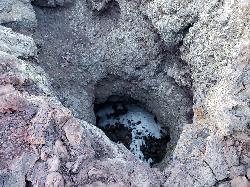
Snow Cone
Visitors Center, Craters of the Moon National Monument
16.6 miles N of Visitors Center, Craters of the Moon National Monument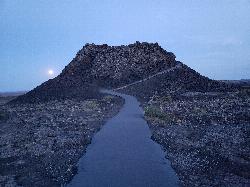
Spatter Cones
Visitors Center, Craters of the Moon National Monument
16.6 miles N of Visitors Center, Craters of the Moon National MonumentThese miniature volcanoes formed when blobs of molten lava were lobbed into the air during the last gasp of an eruption sequence that ended about 2,100 years ago. Craters of the Moon is well known for these beautiful volcanic features. Please help protect them by staying on trails.
Like Yellowstone's Old Faithful, the spatter cone chain at Craters of the Moon best symbolizes the essence of this special place. Created during a dwindling stage of an eruption, the spatter cones formed as hot lumps of lava were thrown a short distance into the air only to fall back to earth around a small central vent. As the still molten blobs landed on top of each other, they cooled and adhered to nearby pieces to form the walls of what could be considered a mini-volcano. The Snow Cone portion of the Spatter Cones Trail is fully accessible.Courtesy of nps.gov
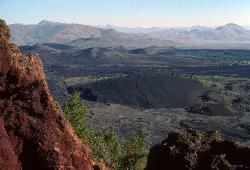
Broken Top Loop Trail
Visitors Center, Craters of the Moon National Monument
15.5 miles N of Visitors Center, Craters of the Moon National MonumentThe Broken Top Loop Trail provides an opportunity to hike over, under and around the youngest volcano on the Snake River Plain. The event that created this cinder cone and associated lava flows culminated about 2,000 year ago at the end of the most recent eruptive cycle. Find out more about the outstanding lava features along the trail by following the trail guide and numbered signs.
Please protect fragile lava features by staying on the designated trail and by following rock cairns across the lava. If you wish to explore Buffalo Cave, don't forget to bring a flashlight and watch your head as you enter the low ceiling of this lava tube.
The Broken Top Loop Trail is one of the most outstanding trails within Craters of the Moon. You can observe nearly every type of volcanic feature characteristic of the basaltic eruptions that created this unearthly landscape. Pick up a trail guide at the visitor center or at the trailhead sign and follow the numbered signs along the trail to learn more. This trail also provides access to Buffalo Caves (best entrance is near sign #8). Obtain a free permit at the visitor center, wear sturdy shoes and bring a flashlight before entering this or any other cave in the park.Courtesy of nps.gov
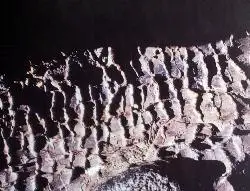
Tree Molds Trail
Visitors Center, Craters of the Moon National Monument
15.5 miles N of Visitors Center, Craters of the Moon National MonumentWhen molten lava advanced through this area it flowed through a grove of living trees. As the trees burned, moisture was released as steam, cooling the hot lava just enough to leave an impression of the charred wood on the surface.
Tree molds may appear as vertical holes in the lava, or if the tree fell on to the surface of a molten flow, a horizontal mold. Look for wooden posts that indicate the location of both types of tree molds near the end of this trail.
Follow the paved ramp that goes south of the trailhead sign near the parking lot. This trail winds through shrubs and stands of limber pine within the Craters of the Moon Wilderness before reaching the edge of the Blue Dragon Flow. While still molten, this lava flow knocked down and ignited trees. The charred tree trunks left impressions in the lava rock. In other places, the trees remained standing as the lava encased them, leaving vertical molds in the cooling lava.Courtesy of nps.gov
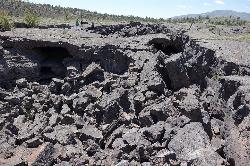
Wilderness Trail
Visitors Center, Craters of the Moon National Monument
15.5 miles N of Visitors Center, Craters of the Moon National MonumentYou will have a sense of solitude as you travel into the Craters of the Moon Wilderness. Begin the trail on the sidewalk that parallels the roadway and turn right to follow the direct route across a young lava flow near the entrance to Buffalo Caves. Follow the metal posts across the lava. After stepping off of the lava turn right at the trail sign. You then pass between Big Cinder and Half Cone cinder cones. Check out the "lava trees" at the short signed trail that leads to these features. Observe Crescent Butte and Coyote Butte as you travel through "trench mortar flats". Echo Crater is a great place to camp! Obtain a required backcountry permit at the visitor center and be prepared to walk through the sage brush to access the easiest entrance on the north-eastern side of the crater.Courtesy of nps.gov

















